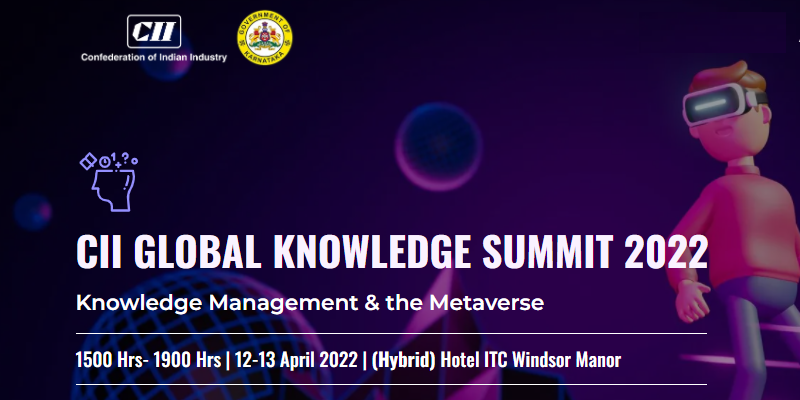India can lead in industrial metaverse applications – in conversation with Derick Jose of Flutura Decision Sciences & Analytics
In this preview article on CII’s upcoming Global Knowledge Summit, we share expert insights on metaverse impacts in industrial sectors.
Derick Jose is Co-founder of Flutura Decision Sciences and Analytics. He is also visiting faculty at the Hasso Plattner Institute of Design at Stanford. He was earlier Vice President for Knowledge Services at MindTree, and is a graduate of BITS Pilani.
Derick is also speaking at CII’s upcoming annual Global Knowledge Summit. The 17th edition of the summit is being held in hybrid format in Bengaluru and online on April 12-13, with the theme of Knowledge Management and the Metaverse.
As media partner for the Global Knowledge Summit, see YourStory’s coverage of the editions from 2021, 2020 and 2019, and sessions takeaways from the Bangalore K-Community meetups.
In this chat with YourStory, Derick talks about the industrial metaverse, opportunities for collaboration between corporates and startups, and opportunities for India in this space.
Edited excerpts of the interview:

YourStory [YS]: Immersive media and blockchain have been around for a while – what is new about the metaverse concept? How would you demystify the hype and misconceptions around it?
Derick Jose [DJ]: Given our focus on the industrial sector (energy, pharma, defense, and others), where we are predicting the health of equipment and process digital twins, we feel the personas monitoring the blindspots in the health of equipment and processes can get a more immersive experience using metaverse.
For example, we are working with energy companies that have a complex array of equipment whose health we are predicting in real time. A reliability engineer can enter the industrial metaverse, look at the subsystems of the process in the metaverse environment, and decide what is the next best action to undertake.
[YS]: In the context of organisational learning and knowledge assets, what contributions does the metaverse make?
[DJ]: The metaverse increases the sensory perception of the persona consuming intelligence from digital twins in the energy, pharmaceutical, and defense sectors.
It can help a reliability engineer go beyond visual identification to include tactile sensors and audio anomalies that give a more realistic feel of what is happening on the ground.
[YS]: What are three most innovative applications you have seen in the metaverse from an industrial perspective?
[DJ]:
1. Real time industrial digital twin diagnostics and prognostics of equipment mapped in metaverse
2. Metaverse simulation for safety operations of complex equipment as part of training programmes for sub-sea operations
3. Collaborative remote troubleshooting of quality of defects. For example, chemical industry engineers in Dusserdolf, Bengaluru and Houston can collaboratively immerse themselves in the metaverse, interrogate the health of processes, and identify root causes of defects.
[YS]: How is Flutura leveraging the metaverse for its clients?
[DJ]: We, at Flutura, think outcome-backward as opposed to a technology-forward approach. Our fundamental questions remain the same irrespective of technology and hype.
What is the minimum guaranteed outcome the metaverse can provide to our customers in the energy, engineering, pharmaceutical and defense sectors?
What is the time to impact for industrial customers? Which business processes are ripe to embed metaverse in? How will the process user’s journey change after embedding metaverse? What is the dollar value unlock for our customers when metaverse is embedded?

Derick Jose (L) and Flutura Co-founders
[YS]: How can large firms and startups collaborate for mutual benefit in the metaverse opportunity?
[DJ]: Large firms have trusted relationships built across years. Startups are agile and can learn on the fly.
Collaboration opportunities exist on a massive scale. But traditional mindsets of large companies need to be unlearnt and relearnt. New mental models need to emerge that result in win-win business models.
We, at Flutura, see opportunities to collaborate, provided the larger players have got their business model right. In this context, Accenture has been a proven partner to Flutura where they have the right mindsets, toolsets and business models to accelerate a startup’s pathway to massive scale.
[YS]: What are your tips for the audience on how to progress along the maturity curve of metaverse deployment?
[DJ]:
Step 1: Map the high value applications of metaverse which are ripe for embedding into business process.
Step 2: Nail the granular business case and ROI model
Step 3: Crawl-walk-run. Start with a 90 day pilot and then scale.
[YS]: At a societal level, will the metaverse trigger off a new kind of digital divide? How can this be overcome?
[DJ]: As was the case with the mobile phone, there will be an initial divide. But as the unit economics becomes affordable, democratisation will happen and the walls around digital divide could crumble.
[YS]: What are India’s unique opportunities, strengths and challenges in the metaverse space?
[DJ]: For industrial applications of metaverse, it needs a confluence of skills – what Flutura calls the graceful collision of ‘experienced grey haired folks’ with the ‘young pony tails!’
The experienced grey haired folks provide domain context to the problem in refining, green energy, process chemicals, and the like. The young pony tails are hungry hackers with limitless energy to find use the metaverse and AI to solve real world problems.
India is a melting pot of grey haired folks and pony tailed folks. This advantage can help create products, services and solutions to globally impact operational outcomes in real-time, sitting out of Bengaluru, Chennai, Coimbatore, Pune or Gurugram.

[YS]: What are some next steps in your metaverse journey at Flutura?
[DJ]: We have already started taking practical steps to execute industrial digital twins in an augmented environment for some of our customers in energy sector. We hope to identify more high-value use cases which have minimum guaranteed impact on balance sheets.
[YS]: Any other parting remarks for our audience?
[DJ]: From an Industrial perspective, India is at the cusp of a renaissance where we can be No. 1 in industrial AI and industrial metaverse applications.
For example, Malleswaram has innovative industrial startups like Ati Motors and Exactspace. Koramangala has Tonbo Imaging. Jayanagar has Flutura. Chennai has Detect Technologies.
This underground movement of industrial AI/metaverse companies can make a huge dent in the global industrial market. A graceful mix of risk capital, innovative applications and real- world experience can make the vision of becoming No.1 a reality through flawless execution.
Let’s make magic happen!
Edited by Kanishk Singh













